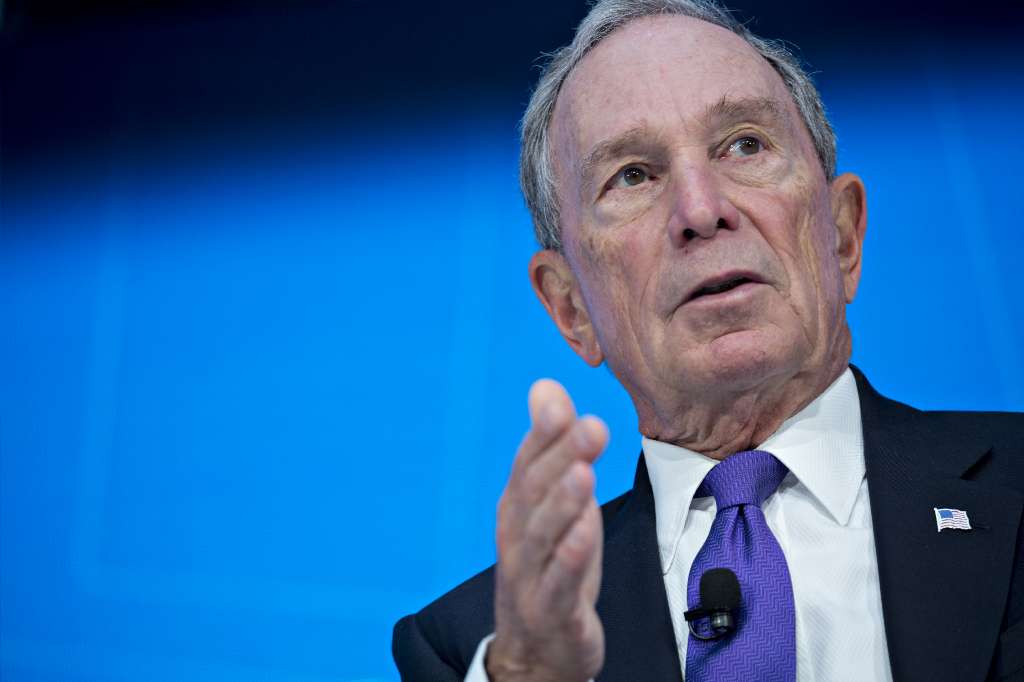I’ve been seeing a lot of Mike Bloomberg lately. During the NFL playoff broadcasts in Illinois, Bloomberg ads have been more common than Patrick Mahomes touchdown passes.
Bloomberg also keeps popping up on my Facebook page, bragging that he started a new business after he was fired at age 39, without mentioning that he did so with $10 million in equity from his time as a partner at Salomon Brothers.
Since announcing his campaign for president, Bloomberg has spent $153 million on advertising. That accounts for one quarter of one percent of his net worth. It’s the equivalent of someone with $10,000 in the bank spending $25.
Bloomberg was not at the last debate in Des Moines. He didn’t want to be in Iowa. As a late entrant to the race, his strategy is to skip the early voting states, and try to win later, delegate-rich states, such as Illinois.
If the strategy works, it could revolutionize the primary process. In an essay for CNN, Bloomberg argued that Democrats are wasting their time in Iowa and New Hampshire, two states unrepresentative of the nation, and unlikely to be competitive in the general election.
(We’ve argued the same thing.)
From Bloomberg’s piece:
“Iowa and New Hampshire are among the most homogenous [states] in the nation. While it’s great that candidates reach out to voters in these states at every pancake breakfast and town hall around, what about African-American, Latino, Asian American, Pacific Islanders, and other voters in places like Detroit, Montgomery, Phoenix, and Houston? I’ve visited them all recently, and almost to a person, voters tell me the other campaigns have almost no presence in their cities…Meanwhile, President Trump is spending his time in Michigan, Wisconsin, Ohio, Pennsylvania, Florida, and North Carolina — all states we lost in 2016 by razor-thin margins.”
Illinois is the state most representative of the nation, and Bloomberg has been spending a lot of time and money here. He’s opened 10 campaign offices, and last week gave a speech at Olive-Harvey College. More than half the states will have voted before Illinois’s March 17 primary, but because no candidate has a dominant lead in the polls, the nomination may still be up for grabs.
Whether Bloomberg can win it — or Illinois, for that matter — is another story.
This is an era of billionaires in politics. It’s a consequence of the growing economic inequality in America. As more and more money flows into fewer and fewer hands, power is following. Our president is a billionaire. Two years ago, Illinois elected a billionaire as governor. Despite Elizabeth Warren’s promise to make billionaires cry, they keep winning elections.
In Illinois, though, Bloomberg will face a lot of obstacles.
As mayor of New York, Bloomberg was a proponent of stop and frisk policing, a tactic brought to Chicago by Garry McCarthy, a former commander in Bloomberg’s NYPD. The practice was reduced drastically after the ACLU reached a settlement with the police requiring documentation of all police stops, including the citizen’s race. As a candidate for mayor, Lori Lightfoot described McCarthy’s tactics as a militarized approach that terrorized communities of color.
“If you were black anywhere in the city, no matter your gender, no matter your age, his directive was, ‘Stop you,’” Lightfoot charged. “Do we really want a city where we put black and brown [citizens] under house arrest, where we don’t engage in constitutional policing?”
Other police reform advocates blamed McCarthy for creating the police culture which contributed to the murder of Laquan McDonald.
“He was allowing officers to violate constitutional rights,” said William Calloway, who ran for 5th Ward alderman last year. “Excessive use of force, illegal search and seizure.”
Bloomberg also spent millions of dollars on ads supporting Toni Preckwinkle’s 2016 soda tax, which was so unpopular it was repealed after only a year. In 2015, Bloomberg’s own ban on large sugary drinks was repealed in New York City, and in 2018, Bloomberg News’s editorial board opined that “new levies in dozens of countries are steering people away from the most dangerous of empty calories.” At the least, Bloomberg seems to consider sugar a public health issue, though some have called his war on soda classist.
“Bloomberg was drubbed for cultivating a ‘Nanny State’ in New York,” wrote Laura Washington in the Sun-Times. “He aggressively pushed policies and laws to curb the consumption of tobacco and soda that feed cancer, heart disease, obesity and other mortal perils.”
Lastly, there’s the fact that Illinois tends to vote for experienced, establishment candidates, which favors Joe Biden here.
Despite all that, Bloomberg has already spent $4.4 million on TV ads in Illinois, and he’s going to spend a lot more. If you think the state deserves more attention in presidential primaries, Bloomberg won’t disappoint you. “I’m sometimes asked if I’m trying to buy the election,” he wrote. “My answer is simple: Know a better use for my money than defeating Donald Trump?”
It’s his money, and this presidential campaign is his vanity project. It may not get him very far in Illinois, though.



